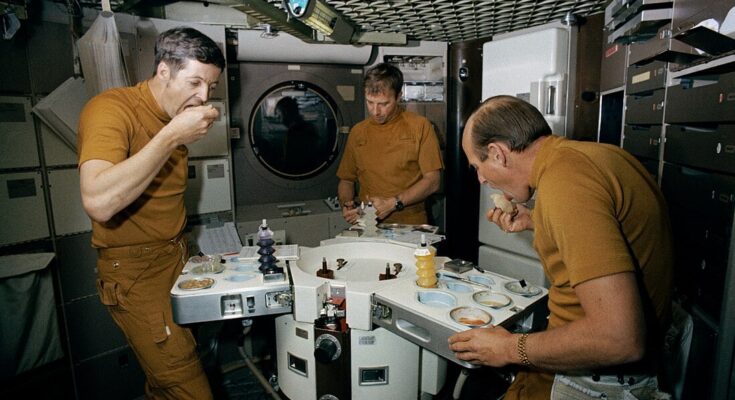Astronauts have limited food choices in space. They eat meals prepared ahead of time and stored in pouches. These meals are freeze-dried, dehydrated, or heat-treated to last longer. To eat, astronauts just add water for a hot or cold meal.
But these meals often taste plain, and astronauts sometimes find it hard to eat enough while on the International Space Station (ISS).
Researchers from RMIT University conducted a unique study. They found that food smells might explain why astronauts don’t enjoy their meals. The study showed that the space environment can change how people smell and taste food.
“A greater sense of loneliness and isolation may also play a role, and there are implications from this study around how isolated people smell and taste food,” said Julia Low, the lead researcher.
Finding the smell of vanilla, almond, and lemon in ISS
The smell is a big part of taste. To find out the smell of vanilla, almond, and lemon, researchers tested 54 people.
In this unique study, researchers used virtual reality (VR) to simulate the International Space Station (ISS). Participants experienced how common food smells change in space.
Scientists from RMIT University have led a world-first study on common food aromas that may help explain why astronauts
report meals taste bland in space and struggle to eat their normal nutritional intake.
— RMIT Research (@ResearchRMIT) July 17, 2024
The study found that the scents of vanilla and almond were stronger in the simulated space station. However, the lemon scent stayed the same.
The stronger smells of vanilla and almond might be due to a sweet chemical called benzaldehyde. This, along with how sensitive each person is to smells, could explain the changes in how these scents are perceived.
“One of the long-term aims of the research is to make better-tailored foods for astronauts, as well as other people who are in isolated environments, to increase their nutritional intake closer to 100%,” Low said.
Loneliness and isolation affect the taste and smell of food
Loneliness and isolation might influence how astronauts perceive food. This study is unique in examining aroma and taste in a group of 54 people under isolated conditions.
In space, gravity’s absence causes fluids to move from the lower body to the upper body. This shift can result in facial swelling and nasal congestion, similar to having a bad cold. As a result, astronauts’ sense of smell and taste diminishes.
These effects, however, are typically short-lived and tend to diminish within a few weeks on the space station.
“Astronauts are still not enjoying their food even after fluid shift effects have gone, suggesting that there’s something more to this,” Low said in the press release.
As missions like Artemis plan longer stays on the Moon, astronauts will be in space for extended periods. Proper nutrition becomes even more critical for their health. This new research suggests that future space food may need to be modified to accommodate these longer missions.





